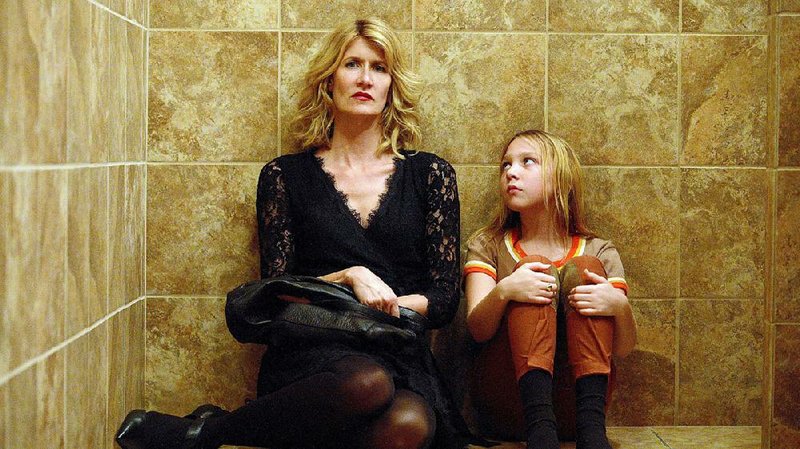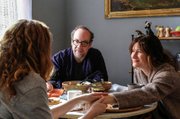PARK CITY, Utah -- Each year at Sundance, you prepare for the worst. You bring your warmest coat and boots, you go and buy expensive, waterproof gloves, and an extra-thermal hat. You buy jeans that repel water, and/or have thermal cloth sewn into them.
This is because the festival happens up in the mountains of Utah in the middle of winter. It would be like having a film festival in Phoenix in July. For many of us coast-living people who don't live more than a few hundred feet above sea level, the 7,000 feet of altitude also saps your strength and, if you don't replenish your hydration levels properly, gives you headaches and vertigo.
To make things even more challenging, the venues of Sundance are spread out all over the area. The distance from one theater to the next might be several miles, which entails you to take a (free!) shuttle from one spot to another, often frantically, as you only have so much time between screenings to get from one long line to another equally long line.
I don't write this to complain, or suggest that it's anything but the highest privilege to be able to go to such a festival and experience the incredible bounty of films there. What I am suggesting is film lovers and press and industry folks and filmmakers make this kind of effort to come here in order to appreciate an art form as integral in our culture as nails are to a hardware store.
We fly in, and deal with all the geographic complexity just so we can experience a bit of the best and brightest of the American Indie scene. We might have to work for it a little bit -- and lord knows, if you aren't a member of the working press, you pay for this experience far more than a little bit -- but we do it out of love and devotion, amid a throng of fellow cinephiles, so we can celebrate the form in all its myriad glory.
This year's festival was a bit more subdued than in past years, and I can't quite put my finger on why. Certainly, there seemed to be no consensus film o' the fest. Nor, truly, were there a glut of films the critics all lost their collective minds over. This was my fourth excursion to Park City, and the first one where I didn't come away secure in the knowledge that I had just witnessed a bunch of films that would go on to grace my best-of-the-year list. Still, there was a lot to see, and a good deal of interesting stuff. So let's get to it, superlative style.
Most Confusing Trend: This year, we had some serious confusion having to do with the titles in the lineup. For one thing, there were a bunch of definite article films such as The Rider, The Trade, The Sentence, The Guilty and The Tale (see below). There were a couple of long-winded selections, You Were Never Really Here and Don't Worry, He Won't Get Far on Foot. And then there was the peculiar glut of first name films: Mandy, Nancy, Tyrel, Lizzie, Madeline's Madeline, not to mention Juliet, Naked. It was possible you thought you had a ticket for a bittersweet-sounding Nick Hornby adaptation, and ended up instead watching Nick Cage laying waste to members of a cult with an ax. Whoops.
Most Welcome Trend: In many ways, this year's Sundance was the Year of the Woman -- from strong, feminist empowerment fare like The Tale, Never Goin' Back, and Damsel -- to an extremely strong lineup of female-helmed films that became hotly anticipated, from such luminaries as Debra Granik (Leave No Trace), Lynne Ramsay (You Were Never Really Here), and Tamara Jenkins (Private Life). What's more, these women all delivered strong entries with some of the best films of the festival.
Most Divisive Film: Let's stick with Mr. Cage a moment, shall we? In my condo of seven critics, easily the film that most divided the group was the aforementioned gore-fest, Mandy. I didn't see this one, so I don't have a vote, but two of the others thought it among the best of the fest; one hated it with every fiber of their being; and two more didn't care for it. I hadn't put it on my schedule mostly because I felt I'd seen plenty enough Nick-Cage-as-raging-loon movies already, but perhaps I will have to reconsider when it is finally released.
Most Obvious Storytelling Enhancement: One trend that came up again and again was the mixing of social media into the storytelling of films having to do with teens (it's almost as if someone should write an essay review on the topic!). Time and again, in films featuring youthful characters -- Search, Rust, Eighth Grade and Assassination Nation, to name a few -- you had emails, texts, videos, and FaceTime chats all incorporated into the storytelling. Sometimes it worked better than you would have imagined (Search, a film that is entirely screen-and-app based); and sometimes it seemed as if the filmmakers were trying entirely too hard (Assassination, which we will hear more about in a bit).
Hardest to Watch: Jennifer Fox is a documentary filmmaker by trade, but for The Tale, one of the most talked-about films of the festival, she has formulated a narrative film about her very real childhood sexual abuse. She casts Laura Dern as the adult version of herself, and a young actress, (Isabelle Nelisse), as her 13-year-old self, sexually abused by her track coach (Jason Ritter), who was also the secret lover of her beloved riding instructor (Elizabeth Debicki). As constructed, the film interrogates Fox's memory of things -- one of the more shocking moments comes early, when she realizes she has cast too old of an actress to play her young self -- and follows the progression from her feeling as if the abuse actually empowered her, to realizing she was a victim after all. It's startling and unsettling stuff that made a huge impact at Sundance. Purchased by HBO, it will be released on the channel later in the year.
Most Unsettling: Sundance has a legacy of good horror fare, especially over the past few years which has seen modern horror classics like It Follows, The Babadook, The Witch and Under the Shadow. This year's prime horror entry was Hereditary, an extremely well-made and meticulous ghost story from Ari Arsted. Set in the Utah mountains, the film follows the paranormal misfortunes of a family haunted by the late, dour mother of the wife (Toni Collette). When a second tragedy befalls them, a pattern begins to emerge. It has oddball elements galore, including stunning diorama treatments, a twisted daughter with a penchant for beheadings (unforgettably played by Milly Shapiro), and an unnerving score straight from the Kubrick playbook. You'll never hear someone clucking their tongue the same way again. With distribution rights bought by indie powerhouse A24, you can expect a big marketing push when it is released in early June.
Most Emotionally Painful: Kayla (Elsie Fisher), the quiet 13-year-old heroine of Bo Burnhall's excellent ode to the most awkward age in the human life span Eighth Grade, made a time-capsule video of herself back in sixth grade, addressing her older self. In it, she rhapsodizes about how wonderful it must be to have made it this far, and talks about all the friends she will no doubt have, even maybe a romance or two. The reality is Kayla is miserable and lonely and doesn't have anywhere near the social acceptance that her younger self imagined. We come to find out in the film that Kayla actually has a lot more moxie and cause for hope than we imagine when we first meet her, but that doesn't make this scene any less cringe-inducing. Another A24 offering, there is no date for its release just yet, but it would seem a natural fit for the summer.
Worst Film: There weren't the enormous highs of past Sundance festivals, but there weren't many lows, either. The exception was Sam Levinson's obnoxious Assassination Nation, about a quartet of high-school lovelies forced to fight for their lives when the town gets hacked and everyone's secrets are suddenly revealed to all. Too brutish for satire, too pleased with itself for resonance, it play-acts at being a wrathful, proto-feminist violent diatribe, but the truth is it just wants to drape its heroines in red leather jackets, load them up with advanced weaponry, and let them roil in carnage. It very much wants to be taken as a statement of the modern zeitgeist, but comes across as desperately trying too hard. If that sounds like something you still want to see, Neon bought it and it's slated for a 2018 release.
Best Performance, Male: You could take your pick of Steve Buscemi roles: a father still mourning his long-ago kidnapped daughter in Christina Choe's Nancy; or as Nikita Khrushchev in Armondo Ianucci's uproarious The Death of Stalin. Or old favorite Paul Giamatti, as a husband trying everything he can to have a child with his wife in Private Life. Or even John Cho, in Search, carrying the emotional weight of an entire film that never leaves its computer screen. But we'd have to go with the double-dose of Joaquin Phoenix, as the late, outrageous quadriplegic cartoonist John Callahan in Gus Van Sant's Don't Worry, He Won't Get Far on Foot; and as the hulking, moody hammer-wielding assassin known as Joe, in Lynne Ramsay's terrific art house action flick, You Were Never Really Here. In these roles, Phoenix, indelibly committed to every role he takes on, has graced us with further proof of his outrageous range.
Best Performance, Female: There were a lot of standouts, as always, including Kathryn Hahn in the aforementioned Private Life; Toni Collette, as the unhinged and beset mother in Hereditary; and Laura Dern in The Tale; but for my money, Andrea Riseborough's turn in Nancy as a slightly deranged woman who believes very strongly that she was abducted as a child and presents herself to a pair of still-grieving parents as their long-lost daughter, takes the prize. Christine Choe's film gives us more than an unreliable protagonist, she seeds the film with enough genuine doubt as to suggest Nancy might actually be onto something. She's like a con woman without an actual grift in mind, and Riseborough is superb in playing along her character's margins.
Best Documentary: There was a decent crop of docs this year, including The Oslo Diaries, but Robert Greene's Bisbee '17, concerning the fretful history of a small, former copper mining town in southern Arizona, captured the essence of the place, while telling the story of its re-enactment of a shameful act of deportation of striking miners some 100 years ago. Being a Greene film, the lines of documentary and fiction are blurred together to make a powerful statement about the nature of immigration and the dominance of the corporate imbalance in our lives.
Best Narrative: In a field of solid entries, Private Life, Tamara Jenkins' first film since 2007's The Savages, stood out for its commitment to its nuanced, fully realized characters. Hahn and Giamatti are excellent, as I've mentioned, but no character, no matter how small their role, gets short-shrifted. Jenkins has created a world milieu that plays like the best kind of novel, a world so precise and well-articulated, she can include a boorish fertility doctor ("Do you like prog-rock?" he asks during an examination, one of the best lines of the festival), a neurotic sister-in-law (an excellent Molly Shannon), whose bitterness rises up in her throat; and a slightly spacey but well meaning niece (Kayli Carter), who wants to help out her step-aunt and uncle anyway she can, and not miss a beat. The film is stocked with such memorable characters, and intense moments of emotional doubt and pain, it's remarkable how funny it can be as well.
MovieStyle on 02/02/2018


